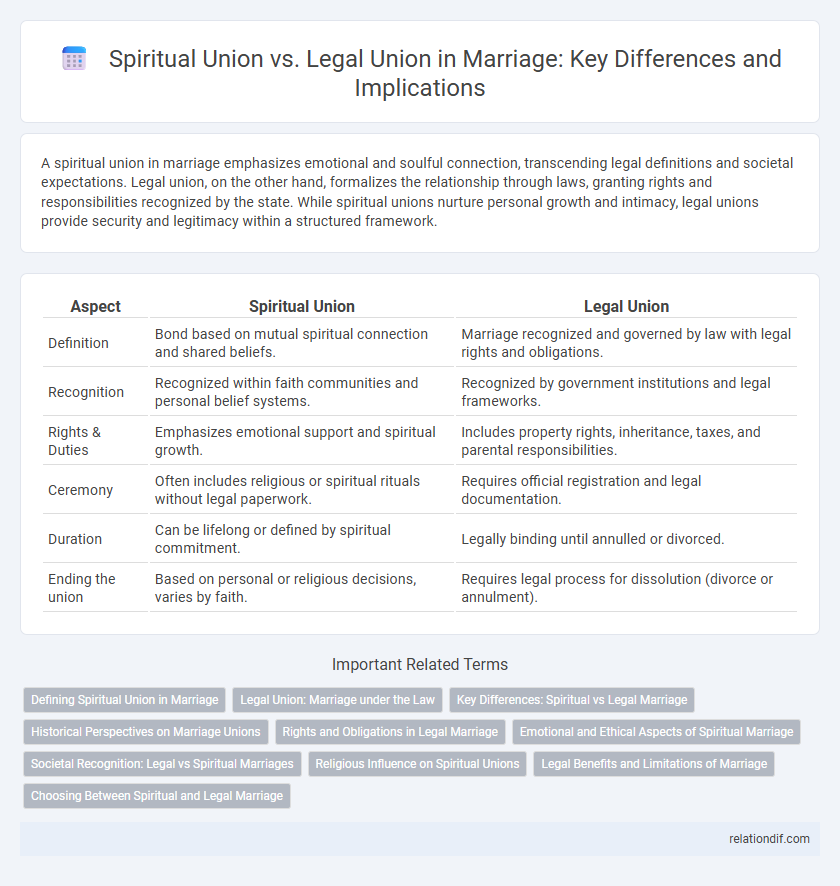A spiritual union in marriage emphasizes emotional and soulful connection, transcending legal definitions and societal expectations. Legal union, on the other hand, formalizes the relationship through laws, granting rights and responsibilities recognized by the state. While spiritual unions nurture personal growth and intimacy, legal unions provide security and legitimacy within a structured framework.
Table of Comparison
| Aspect | Spiritual Union | Legal Union |
|---|---|---|
| Definition | Bond based on mutual spiritual connection and shared beliefs. | Marriage recognized and governed by law with legal rights and obligations. |
| Recognition | Recognized within faith communities and personal belief systems. | Recognized by government institutions and legal frameworks. |
| Rights & Duties | Emphasizes emotional support and spiritual growth. | Includes property rights, inheritance, taxes, and parental responsibilities. |
| Ceremony | Often includes religious or spiritual rituals without legal paperwork. | Requires official registration and legal documentation. |
| Duration | Can be lifelong or defined by spiritual commitment. | Legally binding until annulled or divorced. |
| Ending the union | Based on personal or religious decisions, varies by faith. | Requires legal process for dissolution (divorce or annulment). |
Defining Spiritual Union in Marriage
Spiritual union in marriage emphasizes a deep connection beyond physical and legal bonds, rooted in shared values, emotional intimacy, and mutual growth. This form of union fosters a sense of oneness, aligning partners' inner beliefs and spiritual journeys. Unlike legal union, which is governed by state laws and formal contracts, spiritual union centers on personal commitment and transcendent harmony.
Legal Union: Marriage under the Law
Marriage under the law establishes a binding contract recognized by government authorities, granting spouses specific legal rights and responsibilities. Legal unions regulate property ownership, inheritance, tax benefits, and decision-making authority in medical and financial matters. This formal recognition provides a framework for resolving disputes and ensures protection for both partners within the judicial system.
Key Differences: Spiritual vs Legal Marriage
Spiritual union centers on the emotional, metaphysical, and personal growth aspects of marriage, emphasizing shared values, mutual respect, and deep connection beyond formalities. Legal union, however, involves contractual obligations, government recognition, and rights related to property, taxes, and child custody, ensuring enforceable commitments under civil law. Key differences include the intangible nature of spiritual marriage versus the codified responsibilities and privileges defined in legal marriage statutes.
Historical Perspectives on Marriage Unions
Historical perspectives on marriage unions reveal that spiritual unions were traditionally prioritized in many cultures, emphasizing religious rites and lifelong commitments over legal documentation. Legal unions gained prominence with the development of state systems, formalizing marriage as a contract with social and economic obligations enforceable by law. This shift reflects evolving societal structures where legal recognition of marriage ensured property rights, legitimacy, and inheritance, complementing spiritual bonds.
Rights and Obligations in Legal Marriage
Legal marriage establishes specific rights and obligations codified by law, including inheritance rights, taxation benefits, and spousal support responsibilities. Unlike spiritual unions, legal marriage provides enforceable protections such as joint custody of children and entitlement to healthcare decision-making. These legally binding commitments ensure clarity and security for both partners within the jurisdiction.
Emotional and Ethical Aspects of Spiritual Marriage
Spiritual union in marriage emphasizes deep emotional connections rooted in shared values, mutual respect, and soul-level understanding, fostering a bond beyond legal contracts. It nurtures ethical commitments centered on honesty, empathy, and personal growth, often leading to greater relationship fulfillment and resilience. Unlike legal union, which formalizes rights and obligations, spiritual marriage prioritizes inner harmony and emotional authenticity as foundational to lasting partnership.
Societal Recognition: Legal vs Spiritual Marriages
Societal recognition varies significantly between spiritual unions and legal marriages, with legal unions providing formal acknowledgment through government-issued marriage certificates that affect rights to inheritance, taxation, and healthcare decisions. Spiritual unions, often rooted in religious or cultural traditions, may lack official documentation, limiting their recognition in civil matters despite deep personal and communal significance. Legal marriages create enforceable rights and responsibilities, while spiritual unions primarily offer moral and emotional validation within specific faith or cultural communities.
Religious Influence on Spiritual Unions
Spiritual unions emphasize a deep connection shaped by shared faith, rituals, and divine vows, often guided by religious teachings and sacred traditions. These unions prioritize the soul's bond and spiritual growth over legal documentation or civil recognition. Religious influence fosters a sense of eternal commitment, reinforcing moral values and community support within spiritual marriages.
Legal Benefits and Limitations of Marriage
Legal marriage grants partners rights such as joint tax filing, inheritance, spousal support, and decision-making in medical emergencies, which are not automatically available in spiritual unions. Divorce laws and property division impose financial and legal obligations, creating limitations and potential liabilities for married couples. These legal benefits and constraints influence financial planning, healthcare decisions, and parental responsibilities within a marriage.
Choosing Between Spiritual and Legal Marriage
Choosing between spiritual and legal marriage depends on personal values and goals; spiritual union emphasizes emotional and soul connection, often rooted in religious or cultural beliefs, whereas legal marriage provides formal recognition, rights, and protections under the law. Couples seeking a profound emotional bond may prioritize spiritual commitments, but those desiring property rights, tax benefits, or parental authority often opt for legal marriage. Understanding the distinctions helps individuals make informed decisions aligning with their relationship needs and societal expectations.
Spiritual Union vs Legal Union Infographic

 relationdif.com
relationdif.com